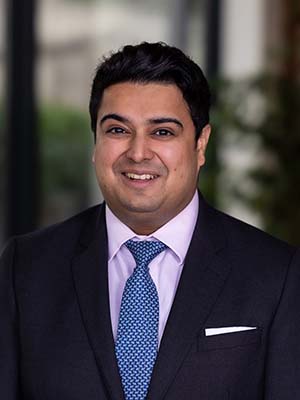Over the past 20 years, advances in technology and communications have created an interconnected world. This progress, combined with shifting societal trends has made it easier for investors to access opportunities across the globe, fundamentally changing investment behaviours.
At the same time, responsible investment and philanthropy have developed a wider appeal. So, what might be in store for the next 20 years as existing wealth is transferred to a new generation of investors, and fortunes are made in industries that are perhaps yet to exist? How can we ensure conversations with multi-generational and next generation clients focus on the right topics? We set out three ideas below:
Global citizens need global investments
The global mindset of this new generation of potential investors is underpinned by an increasingly dynamic education system. In 2023, it was estimated that more than one million international students were studying in the US[1], with many of these hailing from China and India. With the US proposing to ease the H1-B non-immigrant work visa for international graduates[2], we will likely see an increase in the next generation permanently relocating to the US after their studies. In the UK, the academic year of 2021/2022 recorded roughly 680,000 foreign students studying at UK higher education institutions, equivalent to 24% of all higher education students in the UK[3].
The next generation of high earners and entrepreneurs will inevitably have even more of a global outlook. While an investment manager’s primary objective is to structure a portfolio to meet clients’ changing investment requirements, they must also be mindful of inadvertent tax pitfalls affecting clients across the globe. For example, the tax considerations for US connected individuals and families are complex and necessitate specialist advice.
More so than ever, investors are diversifying strategically across global markets with the aim of tapping into growth opportunities across equities, bonds, and alternative strategies. Encouraging investors to look beyond traditional geographical boundaries enables them to benefit from the potential returns generated by long-term thematic trends in the global economy. In particular, key themes such as those identified by Sarasin & Partners – Digitalisation, Automation, Evolving Consumption, Climate Change, and Ageing – will continue to reshape our economies. Investing in leading global companies which are beneficiaries of these trends is likely to present significant opportunities for the next generation of investors to grow their capital.
Evolving attitudes to responsible investing presents opportunities
Despite recent short-term challenges presented by geopolitical events, long-term capital invested by individuals and families increasingly prioritises responsible investment goals alongside performance objectives. It may be a cliché, but it’s often true that these requirements are expressed by members of the younger generation.
At a fundamental level, scrutinising the environmental, social and governance characteristics of a potential investment makes good sense as a complement to detailed financial analysis. To state the obvious, poorly governed companies tend to make bad investments. There is much more nuance, however, to the subject of responsible investment and stewardship, and guiding families with diverse views requires expertise and experience.
Families and their advisers are having increasingly open discussions to understand and respect varying views. This can involve finding common ground and creating diversified portfolios that reflect the collective values and goals of the family, while also educating family members on the potential risks and rewards associated with investing from a responsible standpoint. A good investment manager can guide the conversation to help bridge generational gaps and align investment decisions with the family's long-term plans for wealth preservation. In certain cases, the flexibility to address specific ethical considerations in a bespoke investment strategy can unlock an opportunity to engage with the next generation of family members.
Philanthropic giving
Philanthropic giving has always been at the heart of many wealthy families’ planning in the US, and is becoming more and more prevalent in the UK.
Family foundations and donor-advised funds (DAFs) are popular vehicles to facilitate philanthropic giving. These structures provide flexibility, tax benefits, and a strategic approach to long-term charitable giving. DAFs were first established in the US in the 1930s and their use has also become more common in the UK. Dual compliant US/UK charitable structures are also available to transatlantic families.
While family foundations offer control over the distribution of funds and the ability to create a lasting legacy, they come with administrative responsibilities and regulatory requirements that can be onerous. DAFs, on the other hand, provide a more straightforward approach with lower costs, while still offering tax advantages. They allow donors to recommend grants to their preferred charities, while the sponsoring organisation handles the administrative tasks.
Investment managers and their tax advisers can work closely with different generations of a family to determine the most suitable philanthropic structure. This involves assessing charitable and investment goals, levels of retained control, and associated costs.
Through a different lens
Inheritance and professional success will drive an unprecedented amount of wealth to a new generation. Investment attitudes are evolving and in general, this generation appears passionate about how their investments are managed, and often looks through a different lens. However, much of the research published about the Great Wealth Transfer points to the concern that families are not having the right conversations at the right time. If you require advice on any of the contents of this article, there are excellent advisers on these areas, and we would be delighted to help you find the right team.
[1] https://monitor.icef.com/2023/01/us-foreign-enrolment-once-again-exceeds-one-million-students/
[2] https://economictimes.indiatimes.com/nri/study/us-to-relax-visa-processing-for-graduates-with-job-offers/articleshow/112159216.cms?from=mdr
[3] https://commonslibrary.parliament.uk/research-briefings/cbp-7976/
This document is intended for retail investors and/or private clients. You should not act or rely on this document but should contact your professional adviser.
This document has been issued by Sarasin & Partners LLP of Juxon House, 100 St Paul’s Churchyard, London, EC4M 8BU, a limited liability partnership registered in England and Wales with registered number OC329859, and which is authorised and regulated by the Financial Conduct Authority with firm reference number 475111.
This document has been prepared for marketing and information purposes only and is not a solicitation, or an offer to buy or sell any security. The information on which the material is based has been obtained in good faith, from sources that we believe to be reliable, but we have not independently verified such information and we make no representation or warranty, express or implied, as to its accuracy. All expressions of opinion are subject to change without notice.
This document should not be relied on for accounting, legal or tax advice, or investment recommendations. Reliance should not be placed on the views and information in this material when taking individual investment and/or strategic decisions.
The value of investments and any income derived from them can fall as well as rise and investors may not get back the amount originally invested. If investing in foreign currencies, the return in the investor’s reference currency may increase or decrease as a result of currency fluctuations. Past performance is not a reliable indicator of future results and may not be repeated. Forecasts are not a reliable indicator of future performance.
Neither Sarasin & Partners LLP nor any other member of the J. Safra Sarasin Holding Ltd group accepts any liability or responsibility whatsoever for any consequential loss of any kind arising out of the use of this document or any part of its contents. The use of this document should not be regarded as a substitute for the exercise by the recipient of their own judgement. Sarasin & Partners LLP and/or any person connected with it may act upon or make use of the material referred to herein and/or any of the information upon which it is based, prior to publication of this document.
Where the data in this document comes partially from third-party sources the accuracy, completeness or correctness of the information contained in this publication is not guaranteed, and third-party data is provided without any warranties of any kind. Sarasin & Partners LLP shall have no liability in connection with third-party data.
© 2024 Sarasin & Partners LLP – all rights reserved. This document can only be distributed or reproduced with permission from Sarasin & Partners LLP. Please contact [email protected].




